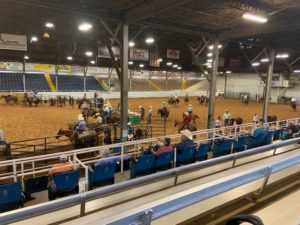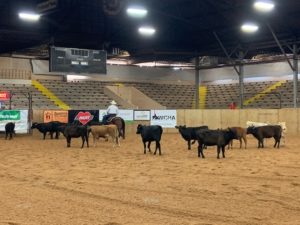 Friendly, fun, and affordable is the mission behind the fast growing World Cutting Horse Association based out of Oklahoma and Texas. Six years ago, Lainie Whitmire founded the WCHA to help cutters with smaller budgets have a place to show. They started with some very small shows but prayed it would work. With the help of friends and their wider network spreading the word, the shows were a success.
Friendly, fun, and affordable is the mission behind the fast growing World Cutting Horse Association based out of Oklahoma and Texas. Six years ago, Lainie Whitmire founded the WCHA to help cutters with smaller budgets have a place to show. They started with some very small shows but prayed it would work. With the help of friends and their wider network spreading the word, the shows were a success.
With approximately 2,000 members, the WCHA works, Whitmire said, because it is made up of friendly, helpful, salt of the earth people who do the hard work. The goal is to make the association fun, inclusive and easy to get involved with.
“I felt like there was a need in the cutting horse industry to [put] more emphasis on the beginner cutters and the weekend cutters because it seemed like everything was geared towards the higher end aged events…I wanted to do something really family friendly that highlighted our beginners,” Whitmire said.
That grass-roots focus can be felt at the shows. If the arena needs to be dragged someone hops on the tractor, if help is needed moving cows, there is always someone willing to get it done. Referring to their members as customers, Whitmire said the association is very service oriented. The WCHA puts out suggestion boxes at shows to hear directly from members.
One of the first things they changed was the schedule. They moved the $2,000 Amateur class to the middle of the day so beginners didn’t have to show at 2:00 or 3:00 in the morning. That went over really well with the members Whitmire said.
They also moved the aged events to the end of the day. They expected some push back from the trainers but everyone was very understanding. Whitmire said having the aged event classes at the end of the day avoids disrupting the weekend classes. This keeps the weekend group happy and the schedule on track.
The WCHA averages two weekend shows a month. They hold their Finals at the end of their competitive year in October. A rider has to qualify by attending three shows a year or by attending the qualifying show a few weeks before.
WCHA Finals give fun awards like “first person to lose a cow” to soften the blow.
They also award a year’s use of a trailer, and present saddles, jackets, and buckles. They make sure every youth goes home with a prize. Pat and Lisa Taylor always donate items like saddle pads, brushes, hoof picks and the like to the youth classes.
Whitmire and her secretary, Missy Enger, focus on ways to reach out to riders who don’t have a trainer.
Not everyone can afford to have their horse with a trainer all the time so they came up with a great idea.

WCHA show at Hardy Murphy Coliseum in Ardmore, OK
At the Finals, trainers each pick a team from the competitors. Tommy Marvin’s team last year was called the Marvelous Marvins, Leon Harold came up with Leon’s Ladies. If someone doesn’t have a trainer they can team up with one at the Finals by being part of their team. As part of the trainer’s team event, the member gets help tuning their horse, watching cattle and a turnback team in the show pen. It also helps the member meet the trainer’s other customers and become part of the cutting community. The trainer whose amateur or non pro wins the most money at the Finals wins a prize.
WCHA is dedicated to helping beginners. At a member’s first cutting, the Association finds them turnback help, shows them their score and explains the judges’ sheet.
Whitmire has known Dave Wolf who runs the Ranch Sorting Association for a long time. At the Fort Worth Show in June this year, they teamed up to share cattle. The WCHA used the cattle first and then the Ranch Sorters numbered and used them. It allowed the WCHA to keep the entry fees down and help their members to show in the famed Will Rogers.
Riders come from all over the country to compete at their Fort Worth show. A couple from Colorado had always attended the NCHA Futurity as spectators but had never been able to have a young horse in training to show at the Futurity. Whitmire said one of those Colorado competitors offered to help hang the banners in the Will Rogers arena.
As she walked into the arena, she started crying. Whitmire went to see if she was ok and said the woman told her that she never imagined in her wildest dreams she would get to show in the Will Rogers. It was a bucket list item for her. Whitmire said that made the whole show worth it. That rider ended up winning a check and said she would frame it.
“I knew people would be happy to be in there, I was hoping they would appreciate it. Until you see someone really have an emotional response, you don’t know what it means to somebody to actually get to be there. But it happened time and time again… Multiple people have come up to us and said we just can’t believe we are going to get to show in Will Rogers…” said Whitmire.
Within growing membership, the WCHA hopes to add affiliates next year. Whitmire said they are looking to branch out to other areas of the U.S where there’s a lack of shows.
“There is a need for people [to have a place to show] that just like to ride and enjoy their horses. Those are the people that will stay in the business. If they like horses they will stay in the business. If they’re a business man that just got into it because it’s a cool thing to do, they didn’t get into it because they love horses and have an agricultural background, I don’t see how they stay in it forever. I see them getting in and getting out,” she said.
WCHA has NCHA judges at their shows. They have one judge over the weekend shows, but their bigger shows have a different judge everyday. Trainers can show as many horses as they want in the Open and novice classes. All of the class qualifications are based on Equi-Stat lifetime earnings, so if a horse has won $100,000 at aged events and weekend events combined, they have to show in the Open not in a Novice class because all money is counted not just weekend money.
In all of the Amateur or Non Pro classes, a competitor can show two horses. To keep it fair, the end of the year standings are based on the horse, so no-one is at an advantage showing two horses in one class.
 The WCHA also offers extra classes. They have the “Select” class for Amateurs and Non Pros competitors 50 years old and older which Whitmire said is a huge class. They also have a class within the Select class called the Super Select for 70 and over which is a jackpot class. There is the CHC Ranch Horse Class, which gives the sorters or anyone with a green horse (or rider) a class to show in. In this class, the competitor can two-hand their horse.
The WCHA also offers extra classes. They have the “Select” class for Amateurs and Non Pros competitors 50 years old and older which Whitmire said is a huge class. They also have a class within the Select class called the Super Select for 70 and over which is a jackpot class. There is the CHC Ranch Horse Class, which gives the sorters or anyone with a green horse (or rider) a class to show in. In this class, the competitor can two-hand their horse.
Whitmire said at the end of the day, the WCHA is about offering everyone the chance to experience the thrill of cutting and the community around it.
“You might not always win but you will make friendships that last a lifetime at the WCHA!”
